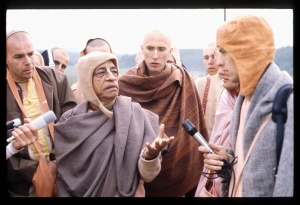CC Madhya 18.108: Difference between revisions
m (1 revision(s)) |
No edit summary |
||
| Line 1: | Line 1: | ||
{{ | [[Category:Sri Caitanya-caritamrta - Madhya-lila Chapter 18|C108]] | ||
<div style="float:left">'''[[Sri Caitanya-caritamrta|Śrī Caitanya-caritāmṛta]] - [[CC Madhya|Madhya-līlā]] - [[CC Madhya 18|Chapter 18: Lord Śrī Caitanya Mahāprabhu's Visit to Śrī Vṛndāvana]]'''</div> | |||
<div style="float:right">[[File:Go-previous.png|link=CC Madhya 18.107|Madhya-līlā 18.107]] '''[[CC Madhya 18.107|Madhya-līlā 18.107]] - [[CC Madhya 18.109|Madhya-līlā 18.109]]''' [[File:Go-next.png|link=CC Madhya 18.109|Madhya-līlā 18.109]]</div> | |||
{{CompareVersions|CC|Madhya 18.108|CC 1975|CC 1996}} | |||
{{RandomImage}} | |||
==== TEXT 108 ==== | ==== TEXT 108 ==== | ||
<div | <div class="verse"> | ||
kintu kāhoṅ ‘kṛṣṇa’ dekhe, kāhoṅ ‘bhrama’ māne | :kintu kāhoṅ ‘kṛṣṇa’ dekhe, kāhoṅ ‘bhrama’ māne | ||
sthāṇu-puruṣe yaiche viparīta-jñāne | :sthāṇu-puruṣe yaiche viparīta-jñāne | ||
</div> | </div> | ||
| Line 12: | Line 16: | ||
==== SYNONYMS ==== | ==== SYNONYMS ==== | ||
<div | <div class="synonyms"> | ||
''kintu''—but; ''kāhoṅ''—where; ''kṛṣṇa''—Kṛṣṇa; ''dekhe''—one sees; ''kāhoṅ''—where; ''bhrama māne''—mistakes; ''sthāṇu-puruṣe''—the dry tree and a person; ''yaiche''—as; ''viparīta-jñāne''—by understanding one to be the other. | |||
</div> | </div> | ||
| Line 19: | Line 23: | ||
==== TRANSLATION ==== | ==== TRANSLATION ==== | ||
<div | <div class="translation"> | ||
“But where they are seeing Kṛṣṇa is their mistake. It is like considering a dry tree to be a person.” | “But where they are seeing Kṛṣṇa is their mistake. It is like considering a dry tree to be a person.” | ||
</div> | </div> | ||
| Line 26: | Line 30: | ||
==== PURPORT ==== | ==== PURPORT ==== | ||
<div | <div class="purport"> | ||
The word sthāṇu means “a dry tree without leaves.” From a distance one may mistake such a tree for a person. This is called sthāṇu-puruṣa. Although Śrī Caitanya Mahāprabhu was living in Vṛndāvana, the inhabitants considered Him an ordinary human being, and they mistook the fisherman to be Kṛṣṇa. Every human being is prone to make such mistakes. Śrī Caitanya Mahāprabhu was mistaken for an ordinary sannyāsī, the fisherman was mistaken for Kṛṣṇa, and the torchlight was mistaken for bright jewels on Kālīya’s hoods. | The word ''sthāṇu'' means “a dry tree without leaves.” From a distance one may mistake such a tree for a person. This is called ''sthāṇu-puruṣa''. Although Śrī Caitanya Mahāprabhu was living in Vṛndāvana, the inhabitants considered Him an ordinary human being, and they mistook the fisherman to be Kṛṣṇa. Every human being is prone to make such mistakes. Śrī Caitanya Mahāprabhu was mistaken for an ordinary ''sannyāsī'', the fisherman was mistaken for Kṛṣṇa, and the torchlight was mistaken for bright jewels on Kālīya’s hoods. | ||
</div> | </div> | ||
__NOTOC__ | |||
<div style="float:right; clear:both;">[[File:Go-previous.png|link=CC Madhya 18.107|Madhya-līlā 18.107]] '''[[CC Madhya 18.107|Madhya-līlā 18.107]] - [[CC Madhya 18.109|Madhya-līlā 18.109]]''' [[File:Go-next.png|link=CC Madhya 18.109|Madhya-līlā 18.109]]</div> | |||
__NOTOC__ | |||
__NOEDITSECTION__ | |||
Revision as of 09:00, 31 August 2021

A.C. Bhaktivedanta Swami Prabhupada
TEXT 108
- kintu kāhoṅ ‘kṛṣṇa’ dekhe, kāhoṅ ‘bhrama’ māne
- sthāṇu-puruṣe yaiche viparīta-jñāne
SYNONYMS
kintu—but; kāhoṅ—where; kṛṣṇa—Kṛṣṇa; dekhe—one sees; kāhoṅ—where; bhrama māne—mistakes; sthāṇu-puruṣe—the dry tree and a person; yaiche—as; viparīta-jñāne—by understanding one to be the other.
TRANSLATION
“But where they are seeing Kṛṣṇa is their mistake. It is like considering a dry tree to be a person.”
PURPORT
The word sthāṇu means “a dry tree without leaves.” From a distance one may mistake such a tree for a person. This is called sthāṇu-puruṣa. Although Śrī Caitanya Mahāprabhu was living in Vṛndāvana, the inhabitants considered Him an ordinary human being, and they mistook the fisherman to be Kṛṣṇa. Every human being is prone to make such mistakes. Śrī Caitanya Mahāprabhu was mistaken for an ordinary sannyāsī, the fisherman was mistaken for Kṛṣṇa, and the torchlight was mistaken for bright jewels on Kālīya’s hoods.